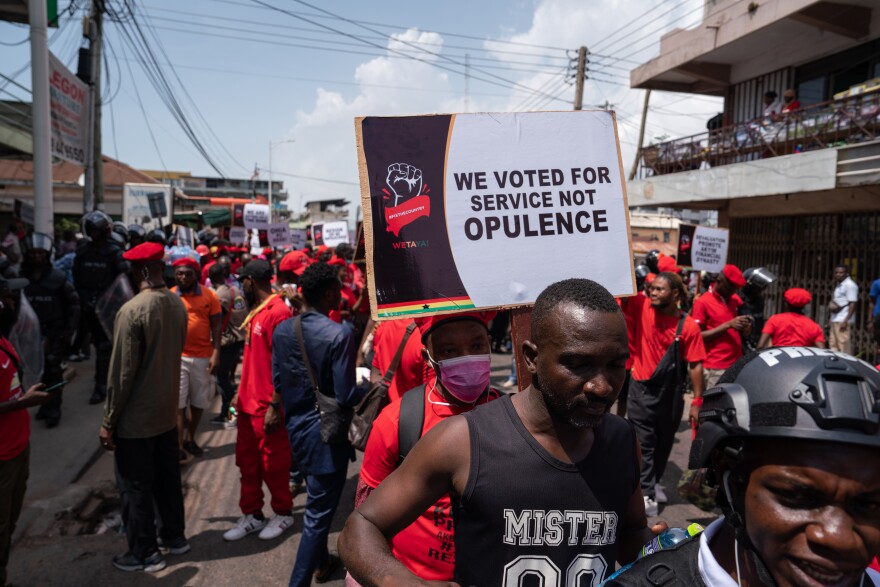LAGOS, Nigeria — Police in Ghana arrested protesters on Thursday during demonstrations against the cost of living and the economic crisis gripping the country. Some journalists who were covering the protests, which took place outside the main government building, were among those arrested.
Activists in the West African country accused police of arresting and abusing peaceful demonstrators as well as bystanders. Police said the protesters were banned from assembling there.
An economic crisis and spiraling cost of living in the last five years have sparked mass upset in Ghana, a country once cast as a model economy in Africa. But security forces have often clamped down on protests that have been taking place with increasing frequency over the past two years.
Hundreds of demonstrators gathered outside of Jubilee House, Ghana's presidential palace in the capital Accra, and were met by heavily armed officers who arrested 49 people. Police said in a statement they were arrested for "the flagrant disregard of a court process" served on the organizers, Democracy Hub, who countered that the process had not resulted in an injunction stopping them from demonstrating.
Protesters said bystanders dressed in black and red — the colors associated with of the anti-government, cost-of-living protesters — were also arrested.
Two BBC journalists said they were among several journalists detained by police, and have since been released.
A lawyer at a police station where protesters were held, who asked not to be named for security reasons, says the protesters were arrested purely for exercising their democratic right.
"The insanity is, the president comes from a legal background and has been involved in at least one very well-known demonstration," the lawyer told NPR, referring to President Nana Akufo-Addo's past as a human rights lawyer and involvement in protests before he became president in 2016. "So the belief would be that in light of the spirit of democracy, the government would allow people to peacefully express their voice and that there would be no curtailing of that voice. What if they were coming out to praise the president — would this thing have happened?"
President Akufo-Addo's government has claimed the country's economic woes are a consequence of the impact of the pandemic and Russia's invasion of Ukraine, which has contributed to rising inflation in several countries around the world.
But in Ghana, many have blamed the government for economic mismanagement and criticized spending on unpopular, expensive projects, such as a new, 5,000-capacity national cathedral, commissioned by the government and costing over $400 million.
In May, Ghana signed a bailout loan with the International Monetary Fund worth $3 billion — its 17th financial rescue from the IMF since 1957.
Copyright 2023 NPR. To see more, visit https://www.npr.org.




